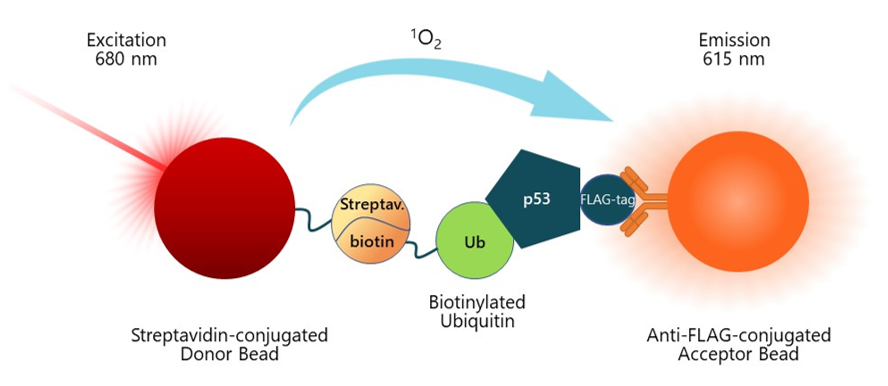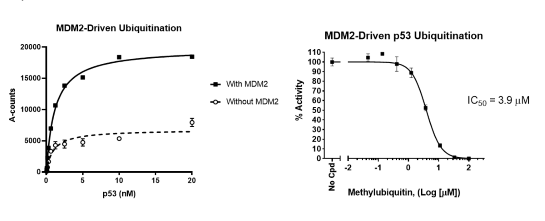MDM2-Driven p53 Ubiquitination Assay Kit
The MDM2-Driven p53 Ubiquitination Assay kit is a sensitive AlphaLisa® high-throughput screening (HTS) assay designed to measure MDM2 (mouse double minute 2 homolog) E3 ligase activity in a homogeneous 384 reaction format. The assay kit comes with enough biotinylated ubiquitin, ATP, FLAG-tagged p53, assay buffer, detection buffer, purified UBE1 (E1), UbcH5b (E2), and MDM2 (E3) for 384 reactions. The assay can detect mono-ubiquitination and poly-ubiquitination of p53.

Figure 1: MDM2-Driven p53 Ubiquitination Assay Kit schematic.
E1 and E2 enzymes are incubated with the E3 complex and FLAG-tagged p53, in the presence of biotin-conjugated ubiquitin and ATP. Ubiquitination of p53 occurs in a multistep ubiquitin transfer from E1 to E2 to E3, and E3-mediated conjugation of ubiquitin to p53. Next, acceptor beads are added, followed by streptavidin-conjugated donor beads. Alpha-counts are then measured. The increase in Alpha-counts is proportional to the mono- or poly-ubiquitination of the FLAG-tagged p53.
Need us to run inhibitor screens or profile your compounds against MDM2-Driven p53? Check out our Ubiquitination Screening Services.
- AlphaLISA® anti-FLAG acceptor beads (Perkin Elmer #AL112C)
- AlphaScreen® Streptavidin-conjugated donor beads (Perkin Elmer #6760002S)
- Optiplate-384 (Perkin Elmer #6007290)
- AlphaScreen® microplate reader
- DNAse free water
- Orbital Shaker
| Catalog # | Name | Amount | Storage |
| 100402 | UBE1 (UBA1), GST-Tag* | 25 µg | -80°C |
| 80314 | UBCH5b, His-Tag (Human)* | 50 µg | -80°C |
| 100409 | MDM2, GST-Tag* | 1 µg | -80°C |
| 100412 | p53, FLAG-Tag* | 2 x 2 µg | -80°C |
| Biotin-Ubiquitin | 400 µl | -80°C | |
| 10 mM ATP | 400 µl | -80°C | |
| U2 Assay Buffer | 2 x 10 ml | -80°C | |
| 4x U2 Detection Buffer | 2 x 2 ml | -20°C |
*The initial concentration of enzyme is lot-specific and will be indicated on the tube containing the protein.
Covalent conjugation to ubiquitin (Ub) is one of the major post-translational modifications regulating protein stability, function, and localization. Ubiquitination is the concerted action of three enzymes: a Ub-activating enzyme (E1), a Ub-conjugating enzyme (E2), and a Ub ligase (E3). The specificity and efficiency of ubiquitination are largely determined by the E3 enzyme, which directs the last step of the Ub-conjugating cascade by binding to both an E2∼Ub conjugate and a substrate protein. This step ensures the transfer of Ub from E2∼Ub to the substrate, leading to its mono- or poly-ubiquitination.
The p53 tumor suppressor protein is regulated by its interaction with MDM2, which serves as a ubiquitin ligase (E3) to target p53 for degradation. MDM2 ubiquitinates p53, resulting in the rapid degradation of p53 through the Ub–proteasome pathway. MDM2-mediated destabilization and inactivation of p53 are thought to play a critical role in several human cancers. The disruption of the MDM2-p53 interaction has been regarded as an attractive strategy for anticancer drug discovery.


